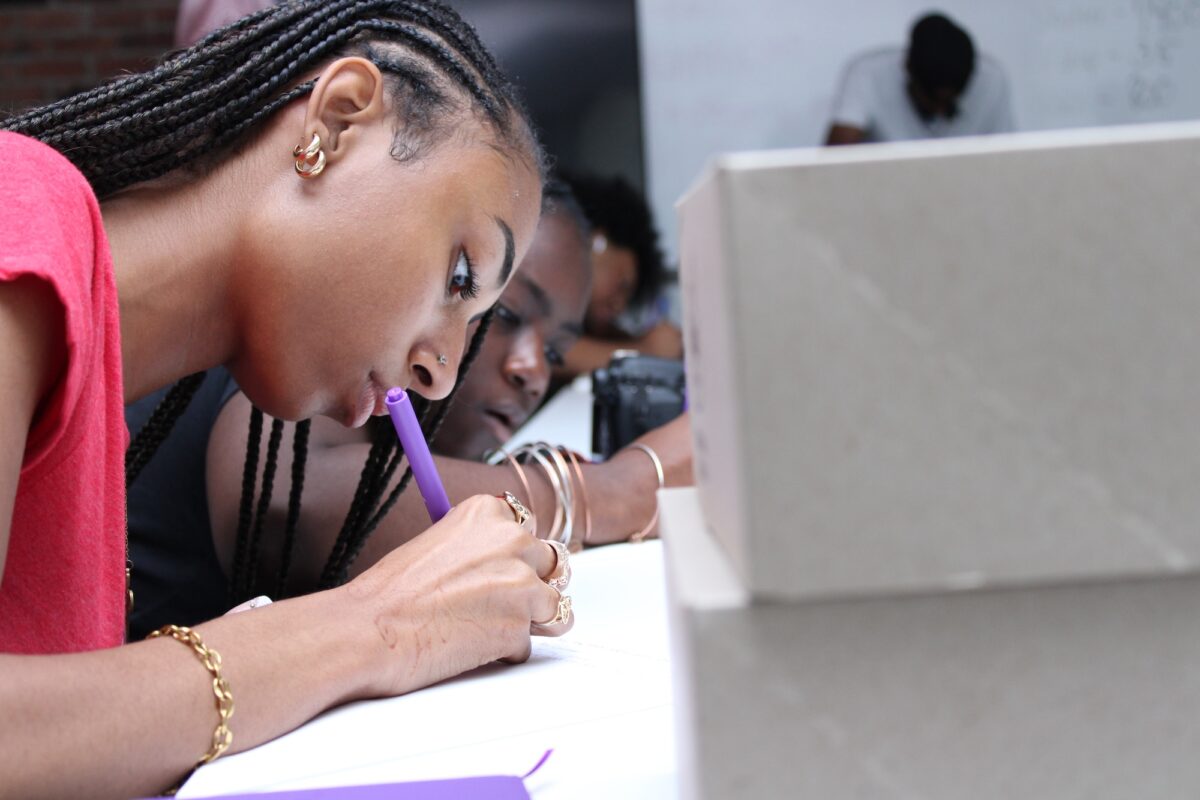by Solomon Spann IV
If Blair Ramsey could advise his overworked teenage self, he’d tell himself:
“You’re not going to be perfect. Nobody’s perfect.”
Ramsey is a director of admissions and the retention coordinator at the University of Detroit Jesuit High School and Academy, an all-male college preparatory academy on Detroit’s west side. There, he observes how young men cope with burnout. In an all-male environment, some young men don’t feel comfortable coming to adults to talk about their feelings.
“Especially for kids, it’s important to have somebody to talk to and express how you feel and not feel like you’re being judged,” Ramsey says.
From late-night study sessions to maintaining a social life, young students at schools like the University of Detroit Jesuit often feel overwhelmed by pressure. While many may seem successful, many quietly suffer from exhaustion.
Burnout, academic, and mental health
Burnout occurs when your emotional, mental and physical state has been depleted by excessive stress and being in constant high-pressure situations. Students often face this challenge when trying to juggle academic standards, extracurricular activities and a social life. When students feel burnt out, they face social, mental, emotional and physical challenges.
Burnout can quickly turn a 4.0 honor roll student into a barely passing student. When feeling burnt out, students often miss deadlines and lose motivation, causing grades to slip. School can start to feel more like a chore than a place of growth.
Jaeli Vélez, a rising senior at University Liggett School, says she struggled in her junior year. “I had a lot of absences because of the mental capacity it took,” she says. “It was so stressful I could not do it last year.”
Vélez’s experience is one that many high-achieving students can relate to, pushing themselves so hard academically that it takes a toll on their physical and emotional well-being. For students like her, burnout doesn’t always look like giving up; sometimes it shows up in quiet withdrawals or missed days.
Mental burnout can make students feel anxious and depressed. Students’ confidence can drop, allowing negative thoughts to creep in. This emotional strain not only affects how students see themselves but also how they interact with others.
“Burnout is excessive tiredness, excessive worry, sporadic behavior, not being able to make decisions or focus,” says Dr. Tonya D. Sims, a clinical therapist with 19 years of experience. “It messes with your mental and physical health, leading to chronic depression, self-isolation and anxiety.”
Socializing and studying
When feeling burnt out, keeping up with your peers is hard because you feel too drained to connect with others, which causes the feeling of isolation to grow wider. Even asking for help might feel too overwhelming, leading to students suffering in silence.
“The most critical impact is self-isolation,” Sims notes. “Students question their place in the world, lose their appetite, can’t sleep and neglect basic self-care.”
When students compare themselves to stats and other students, they can be hurting themselves without even knowing it. Some students chase a number their whole four years of high school. Yet GPA and test scores do not define you as a person.
Students sometimes push their education to the forefront of their lives. Most of the time, this is admirable, highlighting how students prioritize education and their future. Sitting in your room studying night in and night out can be beneficial, but at the same time, some need a break.
Burnout, activities and college applications
Outside of the classroom, students are expected to serve their community and participate in extracurricular activities. While these experiences can be rewarding, they can also get overwhelming and add to the pile of academics.
From student government to clubs, the constant pressure to build a strong résumé can leave students with no time for themselves. What’s meant to be enriching becomes exhausting, leaving students burnt out from trying to do it all.
As students approach graduation, pressure from college applications and scholarships rises. Students are expected to keep grades up while filling out college applications, which can be another homework assignment. The fear of rejection can add to the pressures of the college application, creating a point of anxiety. The college process should feel like a road to new doors, but instead can feel like a race that leaves students emotionally and mentally exhausted before arriving on campus.
Athletic ambition turns to overload
For student athletes, balancing academics and sports can be a daily struggle. The price for a good athletic life can be a social life. Coaches frequently hold mandatory summer workouts, weight training or conditioning sessions that extend past the school year, leaving little time for rest or just summer.
On top of that, many athletes who want to play in college participate in AAU, where college coaches get opportunities to see athletes. AAU requires travel, extra practices and hefty commitment. While these can open up doors to scholarships, the nonstop pressure to perform can push an athlete toward mental, emotional and physical burnout.
That leaves people like Ramsey to find ways to help students prioritize finding a balance in their lives. Ramsey has been there himself. As a 2009 University of Detroit Jesuit graduate, he’s seen the ups and downs of high school student-athletes.
“I know what some of the guys like yourself are doing, and y’all do a lot,” he says. “…I just know what it entails.”
As a dedicated athlete, Ramsey didn’t know he was burnt out throughout his high school career. From workouts with University of Detroit to AAU with Reach Legends, Ramsey didn’t know how to cope with his burnout. Fortunately, Ramsey was able to later talk to a sports psychologist, which helped him.
“Looking back on it, I know I was burnt out at times. I didn’t really have any good coping skills when I was in high school. I went to therapy a few times. I worked with a sports psychologist a few times in high school, which helped me,” Ramsey says.
“But as I got older, I started to get into meditation, practicing mindfulness. Just sitting and praying, those types of things helped me calm my mind, calm my body and quiet everything around me when I was so stressed out or felt overworked.” He suggests kids must go through their mental health journey with someone they can lean on.
The hidden cost of chasing success
As college admissions become increasingly competitive and expectations rise from families, teachers and peers, students are pushed to juggle academics, school sports, extracurricular activities, jobs and social lives with little time to breathe. The grind becomes so normalized that many students don’t realize they’re slipping until they’ve already hit their limit.
But what’s the cost? What are students willing to risk for an accolade, title or scholarship? For some, it’s their social life or physical health. For others, it’s their peace of mind, confidence and mental stability.
For students, burnout becomes their recipe for success. But in reality, students are running on fumes, and the goals they’re chasing start to feel hollow. The pressure to be perfect robs them of the joy that inspired their ambition.
“Everything that you’re going through, you’re meant to go through,” says Ramsey, encouraging students to find meaning even in their most difficult moments.
“Be your authentic self, it’s OK not to be perfect,” Sims adds. “Love and validate yourself first. Everyone is unique, and it’s vital to live as your own original.”
Vélez advises her peers to stay focused and seek help when needed: “If you’re struggling in classes, definitely get a tutor because it really helps…try your hardest to stay on top of things. If you don’t, it might come back to bite you.”
Their words serve as a reminder that while burnout may feel like a requirement for success, it doesn’t have to be. There’s power in slowing down and giving yourself the grace to grow at your own pace.

This piece is part of the Detroit Journalism Summer Camp, run by The Detroit Writing Room in partnership with Planet Detroit.

Solomon Spann IV is a senior at the University of Detroit Jesuit High School with a passion for storytelling. Growing up in Detroit, Solomon has been exposed to a diverse group of cultures. He enjoys playing basketball, listening to music and spending time with family. He enjoys analyzing the players’ performances and is interested in pursuing sports journalism when he gets to college.


